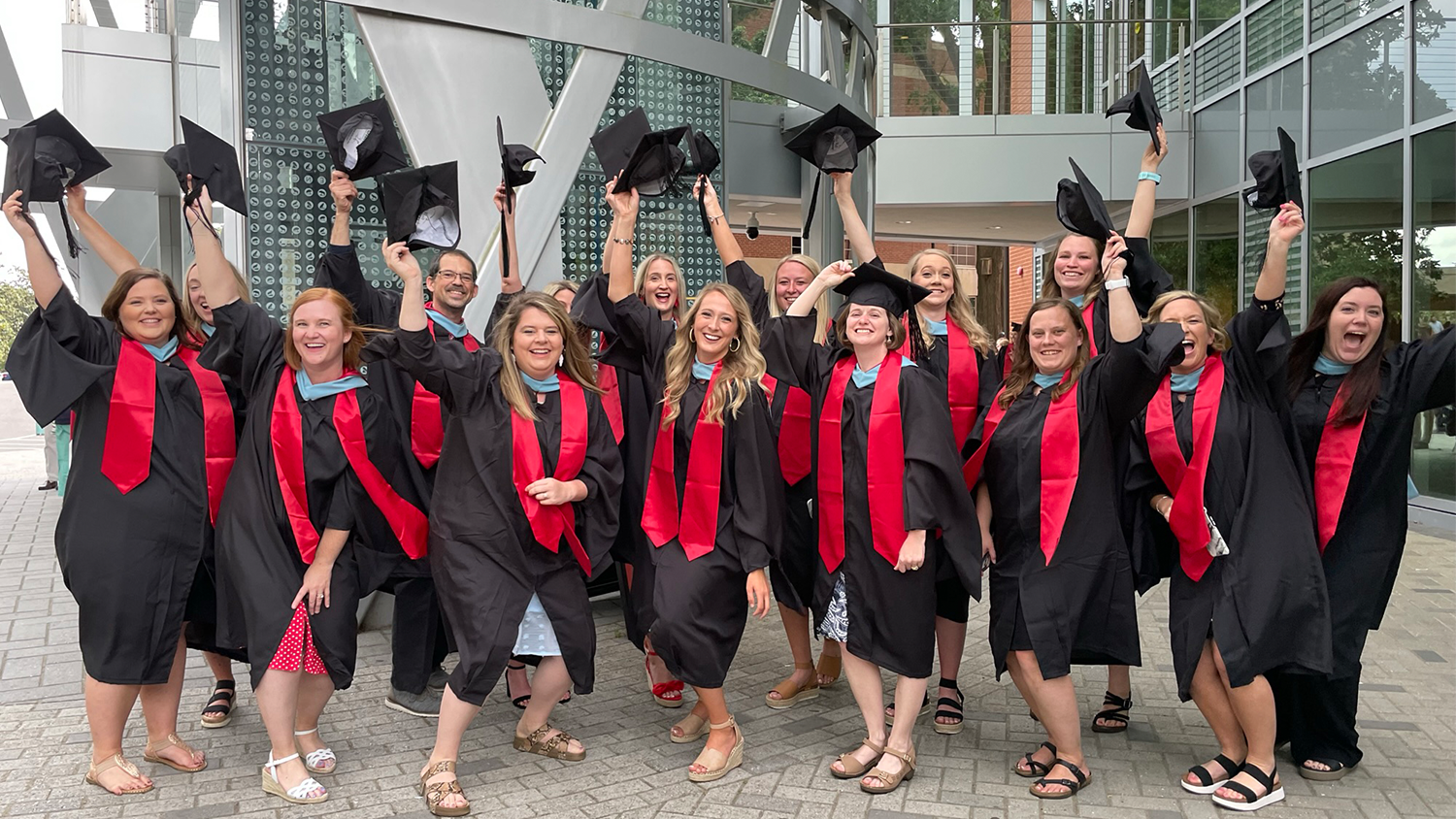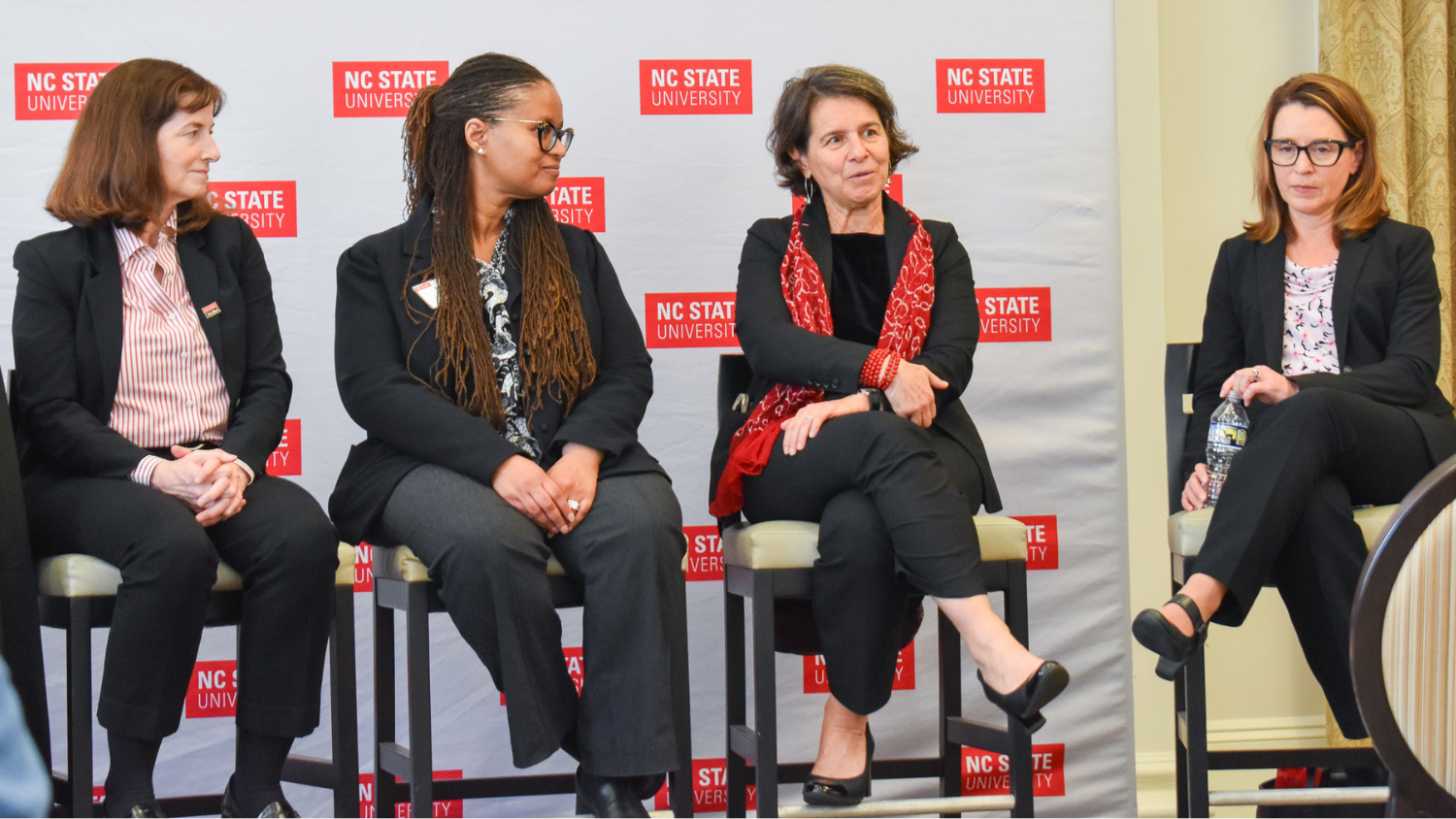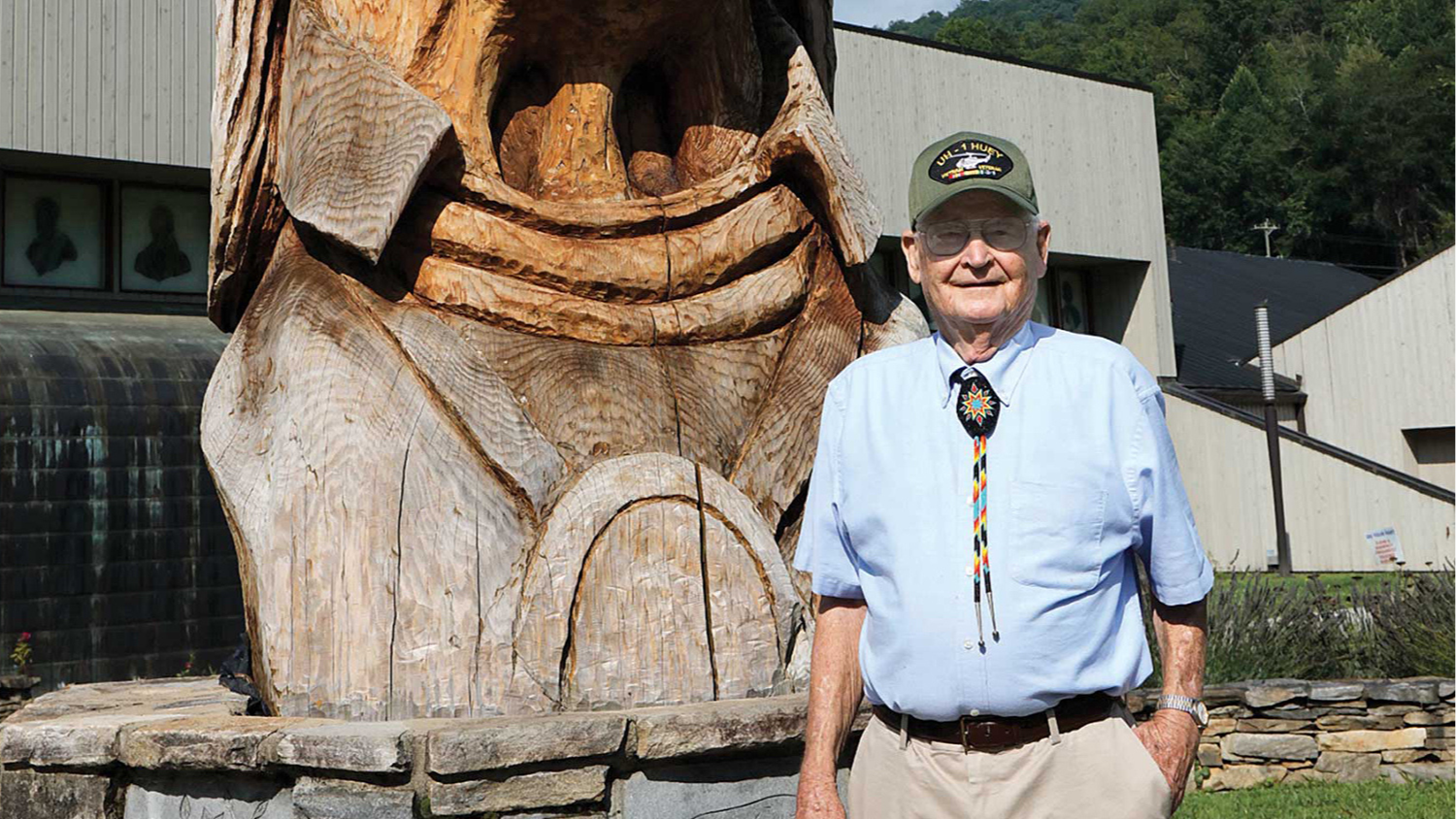‘We’re Not Only Stronger Teachers, But We’re Stronger Leaders:’ 18 Teachers Earn Master’s Degrees, Become Literacy Leaders Through Yadkin Wolfpack Literacy Partnership

When Melissa East ’22MED first set foot in a third grade classroom, she recognized that there were gaps in her instructional knowledge.
East had originally studied to become a physical education teacher before ultimately taking on a position as a classroom teacher. As a result, she felt as though she did not know as much about literacy instruction as some of her peers who had earned degrees in subjects like elementary education. Although she engaged in independent study and sought out professional development opportunities, she wanted more.
When she learned about the Yadkin Wolfpack Literacy Partnership, she immediately knew it could help her advance her skills as an educator.
“When this opportunity came along, I decided I wanted to take advantage of it so that I could learn a lot of the things I need to know to help my students,” said East, who teaches at Falls Creek Elementary School. “It has been a learning adventure, and I say adventure in the best way because I’ve learned so many things that have really been impactful in a positive way in my classroom.”
Funded by a $575,183 grant from the Mebane Charitable Foundation, 18 teachers from Yadkin County Schools were able to earn their master’s degree from the NC State College of Education’s New Literacies and Global Learning program, with a concentration in K-12 Reading, at no cost to them. The goal of the cohort-based Master of Education program was to help teachers gain the advanced expertise necessary to effectively implement evidence-based literacy instruction and become literacy leaders within their district.
All 18 teachers graduated from the College of Education with their master’s degrees in May 2022.
“They have not only gained new knowledge about evidence-based reading instruction, but they have also gained new levels of confidence in their abilities to lead and advocate for effective instruction for other teachers,” said Associate Professor of Literacy Education Dennis Davis, who is the principal investigator on the Yadkin Wolfpack Literacy Partnership.
Putting Theory into Practice
During the 2021-22 school year, Hannah Cox ’22MED, a kindergarten teacher at Courtney Elementary School, watched her students get better at phonemic awareness, the ability to identify and manipulate individual sounds in words.
She already knew phonemic awareness was an important part of the reading process, but Cox said she really didn’t have an in-depth understanding of the concept until she joined the Yadkin Wolfpack Literacy Partnership.
The strategies learned while earning her master’s degree, Cox said, allowed her to be more intentional in practicing letter sounds, starting sounds and rhyming with her students and helping them connect those concepts to other skills they’re developing as beginning readers.
“One of the big things I’ve started focusing on is skills and making sure that these kids, once they have all these skills, are applying them to their reading,” she said. “Being intentional with the word work, they have grown a lot from the beginning of the school year. Their reading scores have looked really good.”
Kennedy Neiderer ’22MED has also noticed growth among the students in her combination second and third grade class at Forbush Elementary School. One third grader, she said, began the 2021-22 school year at a first grade reading level. By the end of the year, his reading scores had improved by 81 points.
She credits a phonics intervention strategy she learned while working with the Wolfpack Readers tutoring program during her time in the Yadkin Wolfpack Literacy Partnership with helping this student, and others in her class, make such progress.
The intervention involved using tiles with letters on them to allow children to manipulate and visualize the sounds and spelling of words, in the same way that more common math manipulatives let children visualize number concepts. When she saw the success of the tiles with Wolfpack Readers students, Neiderer created some for her own classroom.
“In Yadkin County, a lot of our [curriculum] is spent in a workbook, so I felt that having those tiles and having those hands-on interventions and reading activities really helped the students,” she said. “They’re able to manipulate the tiles and fix their mistakes as they go. I really liked that it was a great visual for them.”
Delivering evidence-based interventions to students with reading difficulties in the Wolfpack Readers program gave Yadkin County teachers the freedom to try out new practices in a controlled and supervised setting without the limitations of teaching in a classroom setting, Davis said.
“They also benefited from being able to see the routines work for their students. For example, seeing their Wolfpack Readers take on increased independence as they got more comfortable and familiar with the instructional routines,” he said.
East said the hands-on approach to learning about literacy that was provided through work with the Wolfpack Readers program allowed her to feel comfortable with new strategies before she implemented them for her classroom.
For example, materials she used with Wolfpack Readers are now part of her beginning of the year assessments for struggling readers. This has allowed her to gain a better understanding of the areas in which they need the most support and focus on those during the school year.
“It has completely changed my reading intervention,” East said. “I found that the NC State tutoring materials that were provided to me really made a huge difference.”
East has also helped her students become more engaged readers by providing them with options to choose which books they would read during small group instruction. It’s a change, she said, that she did not fully understand the importance of until taking a class with Assistant Teaching Professor Jill Jones.
“I enjoyed being part of the program because I can see how it is directly impacting me and my career, and it’s bringing positive change to my life and the lives of my students,” East said. “Just to be part of something where I can learn something one day and then the next day apply it to my classroom is pretty awesome.”
Leading the Way for Other Teachers
The impact of the Yadkin Wolfpack Literacy Partnership is already extending beyond the 18 teachers who earned their master’s degree as part of the program to other educators in the region.
One of the partnership’s goals was to enable graduates to become literacy leaders within their district. Neiderer and her colleague Paige Clark ’22MED, who was also a participant in the program, have already begun sharing what they know in order to address what they saw as literacy weaknesses within their school.
The writing curriculum that was widely used within their school, Neiderer said, was not engaging for students who, as a result, were often struggling with writing. In response, she and Clark held a professional development session to share strategies they had learned through their time in the College of Education and Yadkin Wolfpack Literacy Partnership, and had found effective in their own classrooms.
For example, they shared with colleagues ways to make poetry more fun by incorporating lessons like blackout poetry and ways to engage students by incorporating writing workshops, where students publish and share their work with classmates each week.
“We have had a few teachers say that they tried the writer’s workshop style format and really enjoyed that,” Neiderer said. “A lot of teachers have told us that it’s been nice for them to see how excited their kids are getting and how they think ‘I want to do my best because everyone is going to read this.’”
Neiderer and Clark also introduced other teachers to different technologies and resources that they can use in their classrooms and spent time discussing the developmental process of writing so teachers could learn to better differentiate among students who need more help.
Several of the teachers in the Yadkin Wolfpack Literacy Partnership have also shared their knowledge of literacy concepts with a wider audience through a series of YouTube videos called “KnERD Bites.”
“I hope they will keep seeking out and saying ‘yes’ to opportunities to be leaders and mentors for others in their district,” Davis said. “I hope they have formed a network that will extend well beyond the two years of the degree. That was the real objective of this experience all along.”
“It was really an amazing experience, and I know a lot of us feel like we’re not only stronger teachers, but we’re stronger leaders too. That’s really the main takeaway,” Neiderer said.
As teachers in the Yadkin County Schools district are scheduled to begin Language Essentials for Teachers of Reading and Spelling (LETRS) training next year, several Yadkin Wolfpack Literacy Partnership alumni are already planning ways they can use what they learned in the College of Education to assist their colleagues.
Cox said she feels confident in her ability to assist others with new concepts introduced to them through LETRS because she already developed a good understanding of the science of reading while earning her master’s degree.
“I feel like [faculty in the College of Education] did a great job of teaching us about the science of reading. Our district doesn’t start LETRS training until the fall, but I already feel like I have a good basis of the different parts of the science of reading,” she said. “I’m going to be trying to help other teachers in our district with what we’ve learned, to take that knowledge and share it, because it was a great experience.”
- Categories:


